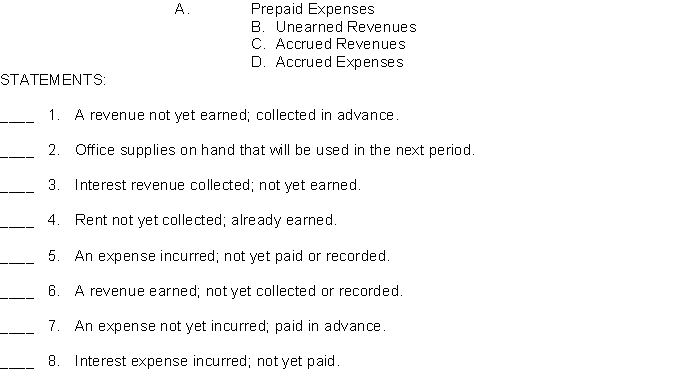Exam 3: Adjusting the Accounts
Exam 1: Accounting in Action276 Questions
Exam 2: The Recording Process223 Questions
Exam 3: Adjusting the Accounts303 Questions
Exam 4: Completing the Accounting Cycle262 Questions
Exam 5: Accounting for Merchandising Operations244 Questions
Exam 6: Inventories257 Questions
Exam 7: Fraud, Internal Control, and Cash238 Questions
Exam 8: Accounting for Receivables269 Questions
Exam 9: Plant Assets, Natural Resources, and Intangible Assets339 Questions
Exam 10: Liabilities317 Questions
Exam 12: Investments227 Questions
Exam 13: Statement of Cash Flows213 Questions
Exam 14: Financial Statement Analysis231 Questions
Exam 15: Accounting and Financial Reporting for Contingent Liabilities and Leases281 Questions
Select questions type
A company using the same accounting principles from year to year is an application of
(Multiple Choice)
4.9/5  (41)
(41)
Match the statements below with the appropriate terms by entering the appropriate letter code in the spaces provided.
TERMS: 
(Essay)
4.9/5  (34)
(34)
Consistency in accounting means that a company uses the same accounting principles from one accounting period to the next accounting period.
(True/False)
4.8/5  (39)
(39)
The ______________ assumption divides the economic life of a business into artificial time periods.
(Short Answer)
4.8/5  (31)
(31)
The income statement is an important financial statement used by individuals who are interested in the operations of a business enterprise. Explain how the time period assumption and the revenue recognition and expense recognition principles provide guidance to accountants in preparing an income statement.
(Essay)
4.8/5  (42)
(42)
______________ is a company-specific aspect of relevance where size is likely to influence the decision of an investor or creditor.
(Short Answer)
4.8/5  (44)
(44)
The expense recognition principle attempts to match ______________ with ______________.
(Short Answer)
4.9/5  (36)
(36)
When companies record transactions in the period in which the events occur, ______ is being applied.
(Multiple Choice)
5.0/5  (38)
(38)
An accounting time period that is one year in length, but does not begin on January 1, is referred to as
(Multiple Choice)
4.8/5  (28)
(28)
Under International Financial Reporting Standards (IFRS) the time period assumption means companies must issue financial statements using a calendar year time period.
(True/False)
4.9/5  (29)
(29)
A liability-revenue account relationship exists with an unearned rent revenue adjusting entry.
(True/False)
4.7/5  (36)
(36)
Myron is a barber who does his own accounting for his shop. When he buys supplies he routinely debits Supplies Expense. Myron purchased $1,500 of supplies in January and his inventory at the end of January shows $400 of supplies remaining. What adjusting entry should Myron make on January 31? 
(Short Answer)
4.8/5  (42)
(42)
Which of the following adjustments would require decreasing the liabilities reported on the statement of financial position?
(Multiple Choice)
4.8/5  (34)
(34)
On Friday of each week, Earle Company pays its factory personnel weekly wages amounting to ₤60,000 for a five-day work week.
Instructions
(a) Prepare the necessary adjusting entry at year end, assuming December 31 falls on Wednesday.
(b) Prepare the journal entry for payment of the week's wages on the payday which is Friday, January 2 of the next year.
(Essay)
4.9/5  (40)
(40)
The monetary unit assumption states that transactions that can be measured in terms of money should be recorded in the accounting records.
(True/False)
4.8/5  (41)
(41)
Which of the following statements concerning accrual-basis accounting is incorrect?
(Multiple Choice)
4.7/5  (32)
(32)
Prepare adjusting entries for the following transactions. Omit explanations.
1. Depreciation on equipment is €800 for the accounting period.
2. There was no beginning balance of supplies and purchased €700 of office supplies during the period. At the end of the period €100 of supplies were on hand.
3. Prepaid rent had a €1,000 normal balance prior to adjustment. By year end €800 was unexpired.
(Essay)
4.8/5  (37)
(37)
Showing 261 - 280 of 303
Filters
- Essay(0)
- Multiple Choice(0)
- Short Answer(0)
- True False(0)
- Matching(0)